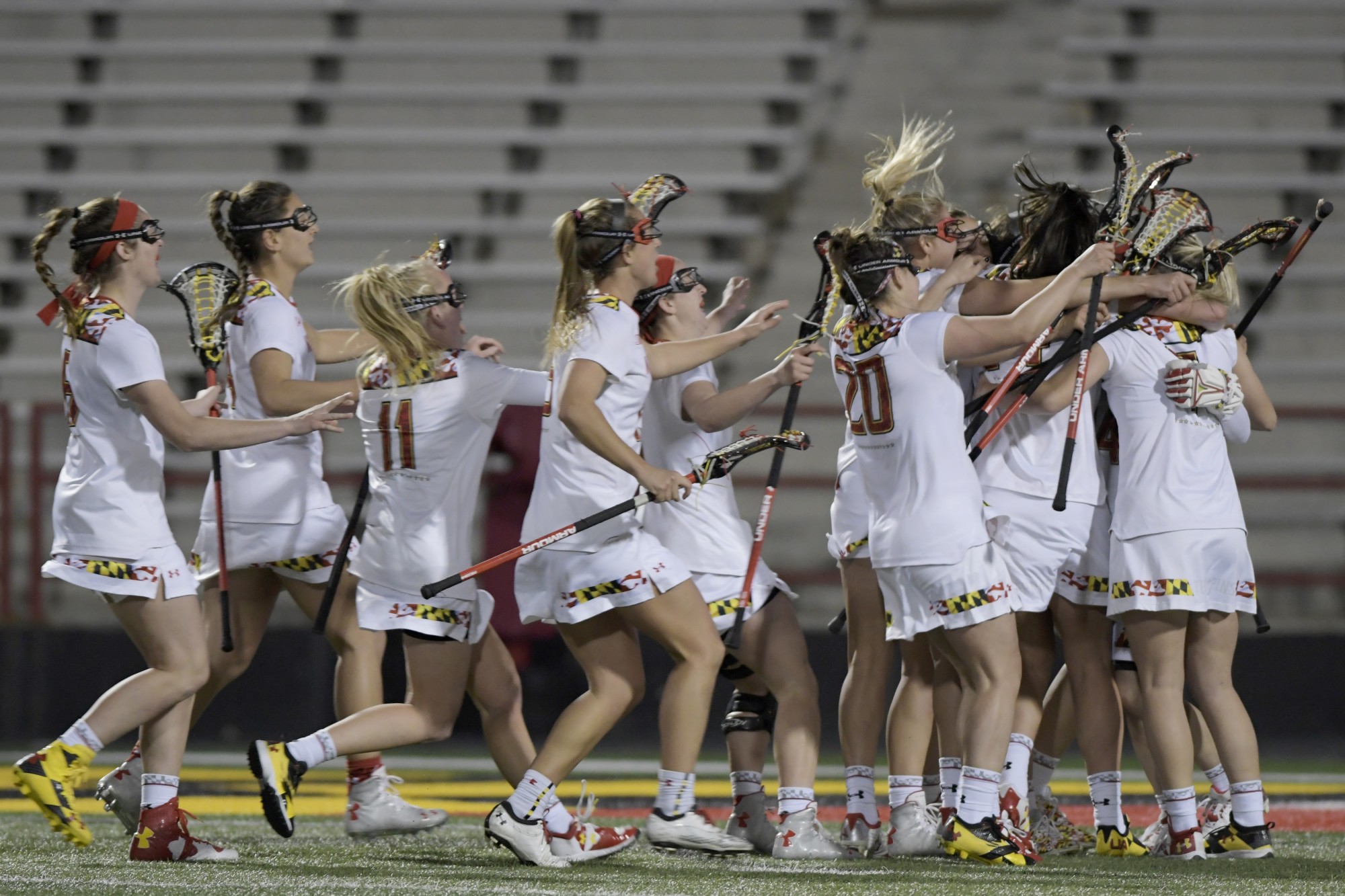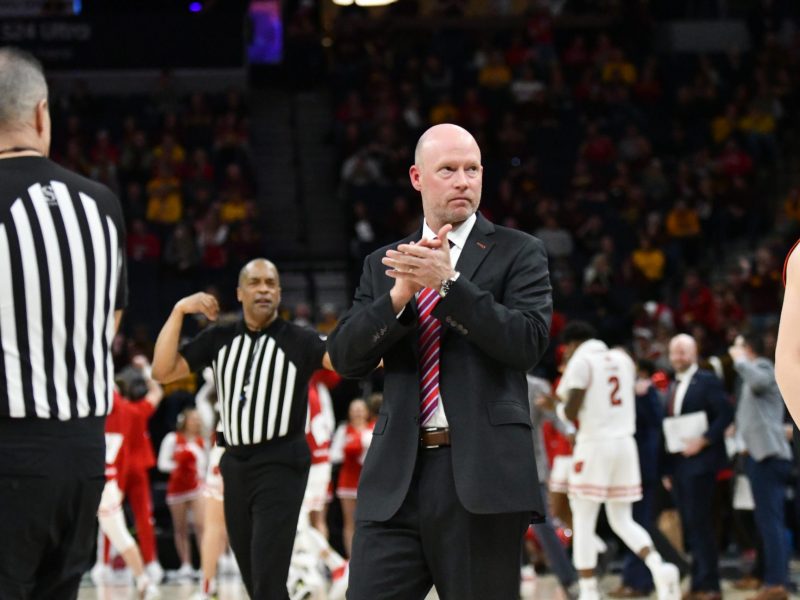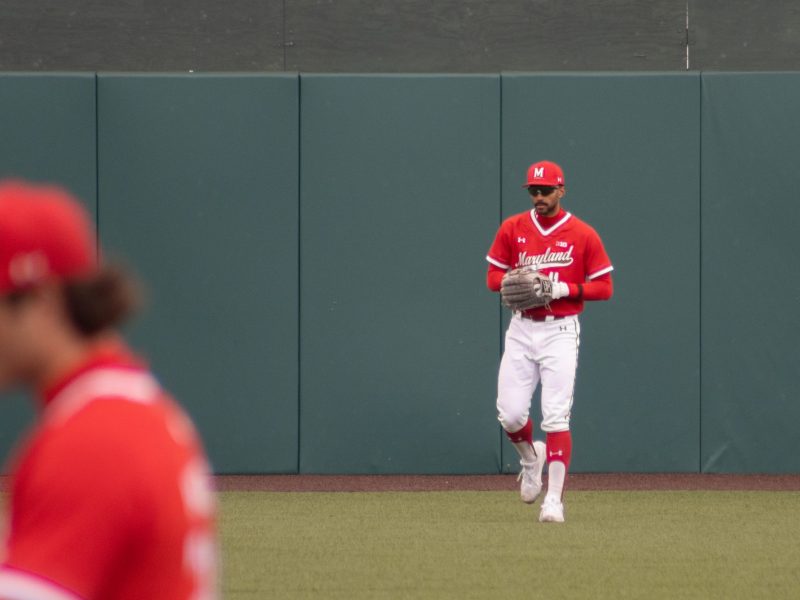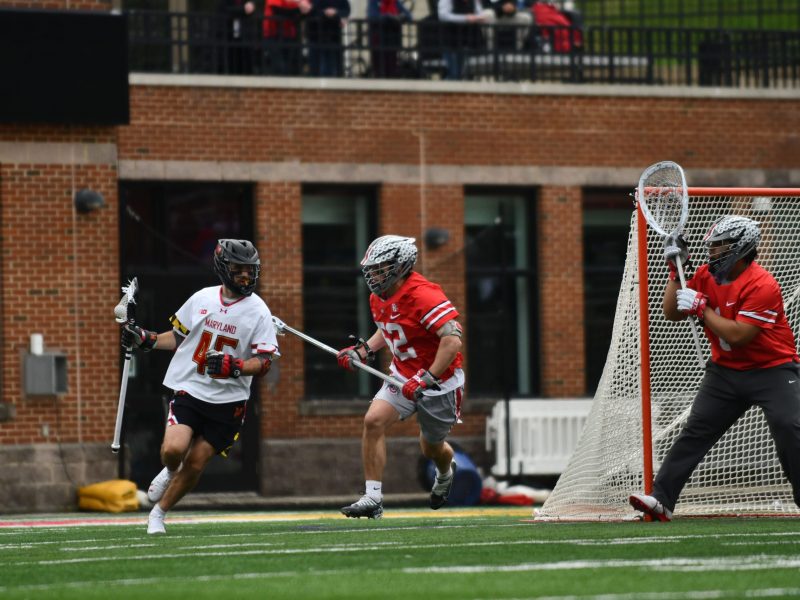Zoe Stukenberg has no idea who makes the amazing soup that appeared this season, but she vowed to identify the chef.
This creamy chicken soup that is “a little spicy” became one of the Maryland women’s lacrosse midfielder’s go-to choices at the team’s postgame tailgates. She narrowed the search down to an unidentified freshman’s parent, but the stew hasn’t appeared in the warm weather.
Stukenberg isn’t sure whether she’ll get to eat it again, but the delicious snack is part of the team’s tailgates, which she, her teammates and their families “go all-out” for.
Nobody knows the date of the first postgame event, but the coaching staff estimates the tailgates have been occurring since the early 2000s, before coach Cathy Reese was at the helm of the program.
“Until recently, I didn’t understand how unique our tailgates are,” Stukenberg said. “Other teams on campus will just walk back to their locker room, maybe have a piece of pizza or something. I’m like, ‘Wait, aren’t you guys going to the tailgate? What are you doing? It’s a home game!'”
After every game, whether it’s home or away, the Maryland women’s lacrosse team awaits food and family as it makes its way out of the locker room.
The tailgating tradition embodies the Maryland women’s lacrosse program’s mantra of building a community, as the program has made four consecutive national championship appearances. The Terps will rely on that cohesion as they begin another postseason next week.
THE FOOD
The No. 1 Terps love food.
From their pregame ritual of dining at College Park’s Bagel Place to the postgame tailgates, the players, coaches and families base their schedules on lacrosse and dining. Stukenberg’s main worry before the Terps took on No. 3 Florida in March had nothing to do with lacrosse. Because the game had an unusual 2 p.m. start time, she was worried about timing her meals.
Given the team’s affinity for eating, the scene of the tailgates is no surprise.
In the parking lot on the south side of the Field Hockey and Lacrosse Complex, long tables stretch about 20 yards with pots, pans and dishes. The food options have changed as families have filtered through the program, while the popular dishes have stuck around.
For instance, Skip Griffin, father of former Terps star attacker Brooke Griffin and current freshman attacker Brindi Griffin, makes homemade French fries Stukenberg described as “delicious.” Defender Alex McKay’s mother, Kim McKay, said a taco salad — with minimal lettuce, a lot of Doritos and ground beef — is popular.
Midfielder Jen Giles said the tailgates provide “a good meal that’s not just pizza,” and the variety of dishes only grows.
The players’ other favorites include Chipotle, fajitas, meatballs, Stukenberg’s father’s crab dip and “dirt” — a pudding with Oreo and whipped cream made by Carol Cummings, mother of former star Taylor Cummings and current attacker Kelsey Cummings.
Carol Cummings worries she’ll get yelled at if she forgets the dessert.
“It’s not just normal sandwiches and stuff because the girls get tired of that, doing that every day,” Skip Griffin said. “The funny thing is, sometimes the girls will just want peanut butter and jelly sandwiches and you’re like, ‘Really?’ They’re like, ‘Yeah, we don’t get those.'”
One of the main roles of the elder parents is to integrate the freshmen families. Cummings said they put the younger parents in charge of catering for Senior Day while integrating new meals. Stukenberg has loved trying those new treats the past four years, adding the variety of the food is “just so fun.”
McKay recalled when her daughter was a freshman, someone asked her to be on the “Terp riser” committee. She first thought the committee was organized to build new stands. Instead, the group made an orange juice and vodka drink to wake the parents up in the morning.
“That was kind of funny,” McKay laughed.

Families and alumni tailgate outside the Field Hockey & Lacrosse Complex. (Sean Whooley/The Diamondback)
THE WORK
Giles’ father, James Giles, sometimes brings an RV, while Griffin drags along a “monster” grill. They set up the tables before the game and sometimes even tailgate before the contest, arriving at least an hour early. Every family brings food.
The players and coaches work hard on the field, so the Terps’ families reward them after games.
“That’s kind of the ‘Maryland way,’ as we call it,” McKay said. “Everybody participates, and everybody contributes.”
Cummings is tasked with organizing the tailgates, but she said she’s sent out about three emails in three years, just for instances they need to make sure certain items are brought. Otherwise, “It just usually works out.”
When the tailgate ends, the families clean up and leave the Field Hockey and Lacrosse Complex in about five minutes.
However, the team continues the tradition on road games, and they haven’t missed a contest this season.
“We’re in Chicago, and we’re having a tailgate, or we are at Rutgers at 10 o’clock at night, and we are having a tailgate,” McKay said. “It doesn’t matter how far they stick us — parents are there in full force providing food.”
Behind the John R. Thompson Jr. Intercollegiate Athletic Center at Georgetown on Feb. 18, the Terps tailgated. In a parking lot next to the Bryce Jordan Center at Penn State on April 20, the parents set up shop.
The tailgates at away games move quickly, especially at night when the Terps have to return home. Sometimes, Cummings said, the players put wrapped goods inside a plastic bag so they can take them on the bus.
The families, despite mostly living in Maryland, always make the trips.
Defender Nadine Hadnagy, who hails from Farmingdale, New York, said her father comes to every game. McKay added other New York families and those from New Jersey seem to be present just as often as Maryland parents, while goalkeeper Emily Kift’s family makes multiple trips from California each season.
The one exception is attacker Theo Kwas’ family, but McKay said even Kwas’ parents make the trek from Australia at least once a year.
“It’s a lot of work, but that’s part of it,” Griffin said. “It really helps the kids, and the kids love it.”
THE CULTURE
Reese hasn’t only won three national championships, but she’s created a family dynamic within the program.
“The difference between Maryland and other schools is that, at other schools, the coaches don’t come to the tailgates,” Griffin said. “At a lot of schools, it’s small, and just people on the team come. Here, you get people that graduated 10 years ago and their parents.”
Stukenberg’s sister plays for the Monmouth University women’s lacrosse team, and they have tailgates, too. But Stukenberg joked her parents often tell her the Maryland tailgates “are just … they’re special.”
Players invite their friends, and Stukenberg sometimes brings her high school teachers. Cummings receives more hugs at a tailgate than she does in a month anywhere else.
On the rare occasion parents from outside Maryland can’t attend, the community makes the out-of-state Terps feel at home.
“They just kind of take you under their wing, and you never feel like you’re alone or anything,” Hadnagy said. “If parents aren’t here, immediately someone else comes up and says, ‘Here, come hang out with us for a little while.'”
The players and family members have bought into Reese’s ideals of building a community. McKay equated the tailgates to the way “families break bread.”
Reese, in her 11th season as head coach, believes the tailgates have been crucial in creating the team’s chemistry. That culture has placed the Terps one game away from their third straight undefeated regular season, even after losing three starters from last year.
“To have so many families come to all of our games on a regular basis and provide that support for all of our student athletes, it just shows the kind of culture we have here associated with our program,” Reese said. “That’s really special.”



